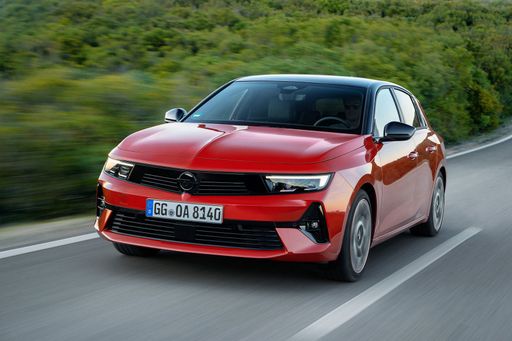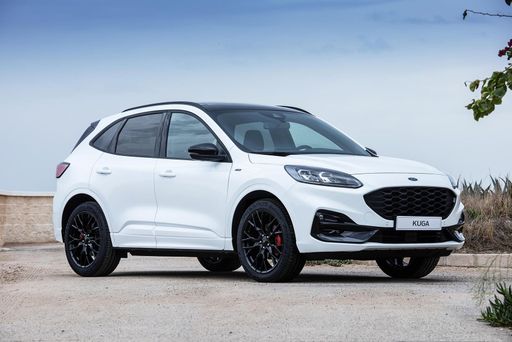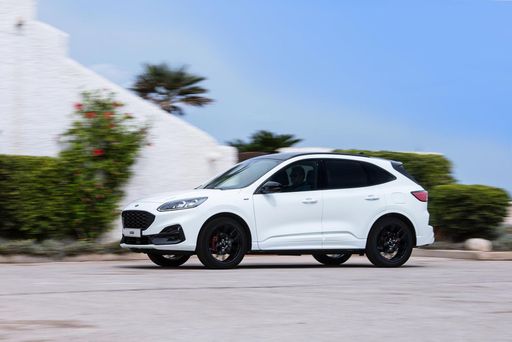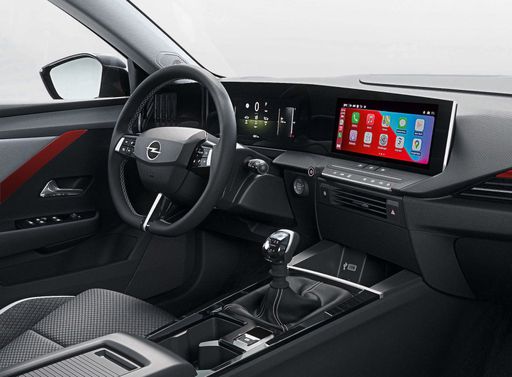Ford Kuga vs Vauxhall Astra - Differences and prices compared
Costs and Efficiency:
Price and efficiency are key factors when choosing a car – and this is often where the real differences emerge.
Vauxhall Astra has a noticeable advantage in terms of price – it starts at 25200 £, while the Ford Kuga costs 34200 £. That’s a price difference of around 9051 £.
Fuel consumption also shows a difference: Vauxhall Astra manages with 2.20 L and is therefore evident more efficient than the Ford Kuga with 2.80 L. The difference is about 0.60 L per 100 km.
As for range, the Vauxhall Astra performs convincingly better – achieving up to 419 km, about 351 km more than the Ford Kuga.
Engine and Performance:
Under the bonnet, it becomes clear which model is tuned for sportiness and which one takes the lead when you hit the accelerator.
When it comes to engine power, the Ford Kuga has a minimal edge – offering 243 HP compared to 225 HP. That’s roughly 18 HP more horsepower.
In acceleration from 0 to 100 km/h, the Ford Kuga is slight quicker – completing the sprint in 7.30 s, while the Vauxhall Astra takes 7.50 s. That’s about 0.20 s faster.
In terms of top speed, the Vauxhall Astra performs slightly better – reaching 235 km/h, while the Ford Kuga tops out at 200 km/h. The difference is around 35 km/h.
There’s also a difference in torque: Vauxhall Astra pulls evident stronger with 360 Nm compared to 240 Nm. That’s about 120 Nm difference.
Space and Everyday Use:
Beyond pure performance, interior space and usability matter most in daily life. This is where you see which car is more practical and versatile.
Seats: offers more seating capacity – vs .
In curb weight, Vauxhall Astra is a bit lighter – 1341 kg compared to 1526 kg. The difference is around 185 kg.
In terms of boot space, the Vauxhall Astra offers slight more room – 422 L compared to 412 L. That’s a difference of about 10 L.
In maximum load capacity, the Ford Kuga performs slightly better – up to 1534 L, which is about 195 L more than the Vauxhall Astra.
When it comes to payload, Ford Kuga hardly perceptible takes the win – 550 kg compared to 509 kg. That’s a difference of about 41 kg.
Who wins the race?
The Vauxhall Astra proves to be leaves the rival little chance and therefore becomes our DriveDuel Champion!
Vauxhall Astra is the better all-rounder in this comparison.
 @ Opel / Stellantis Media
@ Opel / Stellantis Media
Vauxhall Astra
Costs and Consumption
View detailed analysis
Engine and Performance
View detailed analysis
Dimensions and Body
View detailed analysis
Ford Kuga
The Kuga is Ford’s adaptable family SUV that blends usable space with a surprisingly lively driving character, making daily commutes and weekend escapes equally enjoyable. With smart interior packaging, an easy-to-use infotainment setup and composed road manners, it’s a sensible choice for buyers who want a bit of fun without the fuss.
details @ Ford Motor Company / Ford Media Center
@ Ford Motor Company / Ford Media Center
 @ Ford Motor Company / Ford Media Center
@ Ford Motor Company / Ford Media Center
 @ Ford Motor Company / Ford Media Center
@ Ford Motor Company / Ford Media Center
Vauxhall Astra
The Opel Astra strikes a neat balance between everyday practicality and engaging handling, so the daily grind suddenly feels a bit less dull. Inside it's intelligently packaged with modern kit and comfortable seating, making it a very sensible pick for buyers who want a dependable hatchback that doesn't take itself too seriously.
details @ Opel / Stellantis Media
@ Opel / Stellantis Media
 @ Opel / Stellantis Media
@ Opel / Stellantis Media
 @ Opel / Stellantis Media
@ Opel / Stellantis Media
 @ Ford Motor Company / Ford Media Center
@ Ford Motor Company / Ford Media Center
|
 @ Opel / Stellantis Media
@ Opel / Stellantis Media
|
|
|
|
Costs and Consumption |
|
|---|---|
|
Price
34200 - 46300 £
|
Price
25200 - 40500 £
|
|
Consumption L/100km
2.8 - 6.8 L
|
Consumption L/100km
2.2 - 6 L
|
|
Consumption kWh/100km
-
|
Consumption kWh/100km
15.40 kWh
|
|
Electric Range
68 km
|
Electric Range
82 - 419 km
|
|
Battery Capacity
1.1 - 14.4 kWh
|
Battery Capacity
51 kWh
|
|
co2
55 - 154 g/km
|
co2
0 - 135 g/km
|
|
Fuel tank capacity
42 - 54 L
|
Fuel tank capacity
42 - 52 L
|
Dimensions and Body |
|
|---|---|
|
Body Type
SUV
|
Body Type
Hatchback
|
|
Seats
5
|
Seats
5
|
|
Doors
5
|
Doors
5
|
|
Curb weight
1526 - 1859 kg
|
Curb weight
1341 - 1736 kg
|
|
Trunk capacity
412 L
|
Trunk capacity
352 - 422 L
|
|
Length
4604 - 4645 mm
|
Length
4374 mm
|
|
Width
1882 mm
|
Width
1860 mm
|
|
Height
1673 - 1681 mm
|
Height
1432 - 1488 mm
|
|
Max trunk capacity
1534 L
|
Max trunk capacity
1268 - 1339 L
|
|
Payload
541 - 550 kg
|
Payload
414 - 509 kg
|
Engine and Performance |
|
|---|---|
|
Engine Type
Petrol, Full Hybrid, Plugin Hybrid
|
Engine Type
Petrol, Diesel, Electric, Petrol MHEV, Plugin Hybrid
|
|
Transmission
Manuel, Automatic
|
Transmission
Manuel, Automatic
|
|
Transmission Detail
Manual Gearbox, CVT, Automatic Gearbox
|
Transmission Detail
Manual Gearbox, Automatic Gearbox, Reduction Gearbox, Dual-Clutch Automatic
|
|
Drive Type
Front-Wheel Drive, All-Wheel Drive
|
Drive Type
Front-Wheel Drive
|
|
Power HP
150 - 243 HP
|
Power HP
130 - 225 HP
|
|
Acceleration 0-100km/h
7.3 - 9.9 s
|
Acceleration 0-100km/h
7.5 - 10.6 s
|
|
Max Speed
195 - 200 km/h
|
Max Speed
170 - 235 km/h
|
|
Torque
240 Nm
|
Torque
230 - 360 Nm
|
|
Number of Cylinders
3 - 4
|
Number of Cylinders
3 - 4
|
|
Power kW
111 - 178 kW
|
Power kW
96 - 165 kW
|
|
Engine capacity
1496 - 2488 cm3
|
Engine capacity
1199 - 1598 cm3
|
General |
|
|---|---|
|
Model Year
2025
|
Model Year
2023 - 2025
|
|
CO2 Efficiency Class
E, D, B
|
CO2 Efficiency Class
D, A, C, B
|
|
Brand
Ford
|
Brand
Vauxhall
|
What drivetrain options does the Ford Kuga have?
The Ford Kuga is available as Front-Wheel Drive or All-Wheel Drive.
The prices and data displayed are estimates based on German list prices and may vary by country. This information is not legally binding.
